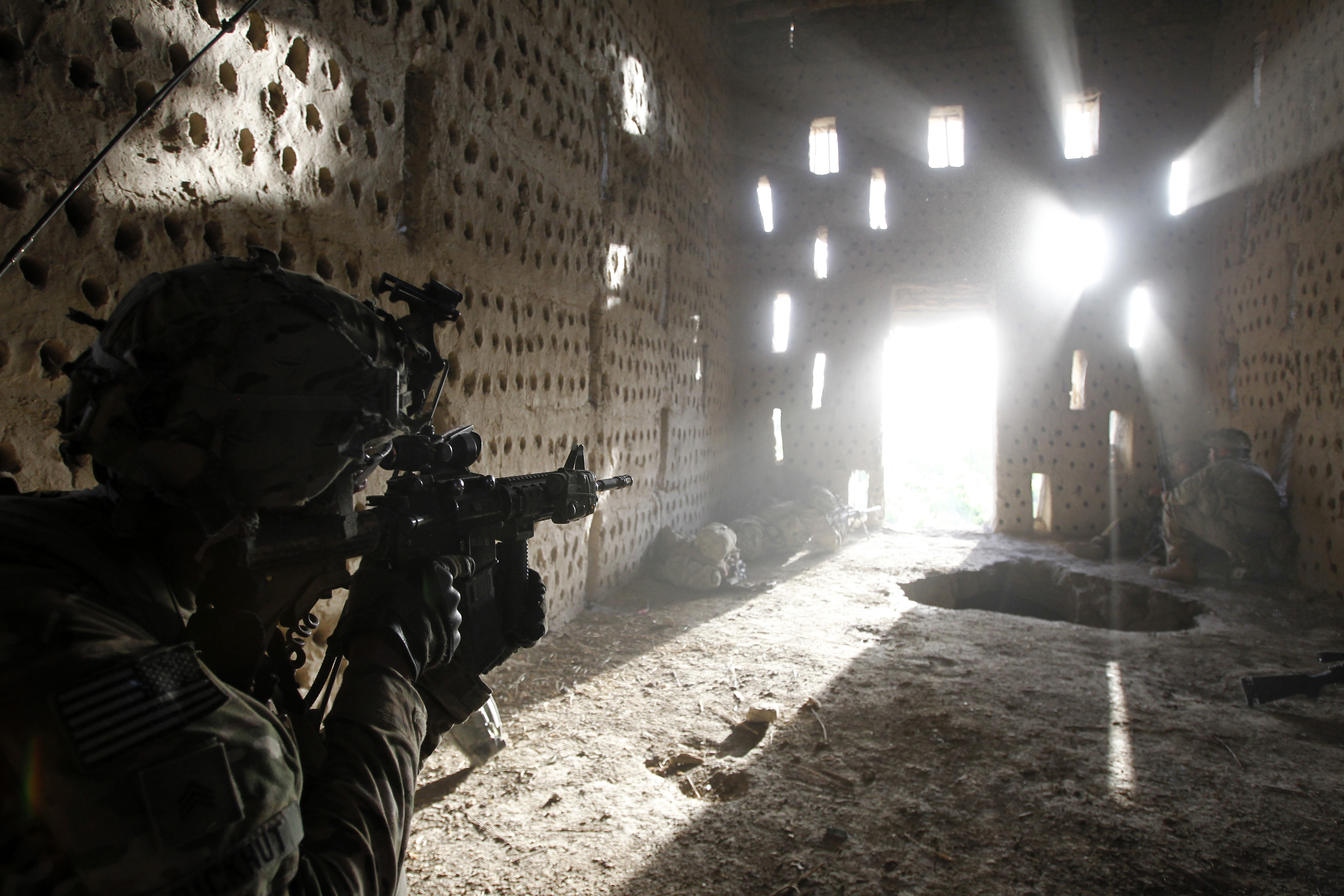Republicans just can't quit the forever war
The GOP is once again drawing up plans to use the U.S. military, as Kurt Vonnegut once wrote, "like toys a rich kid got for Christmas"


In the gruesome, bloodstained years after 9/11, it seemed like the United States learned a painful lesson: There are limits to American military power. Bush-era disasters in Afghanistan and Iraq seemed to prove to much of the country that constant and aggressive use of U.S. military force abroad only reinforces the regional chaos that is the ultimate source of strength for extremist groups like al Qaeda and ISIS.
For awhile there, even neoconservatives were shamed by the rivers of blood unleashed by their wars of aggression. They quieted their warmongering tone. But all that appears to be behind us. All it took was some time, and a terrorist attack in a country 4,000 miles away. Republicans are now back on the warpath.
Of all the 2016 GOP presidential contenders, Florida Sen. Marco Rubio has taken the most belligerent posture. As Matt Yglesias details, as both the de facto GOP establishment candidate and sitting member of the Senate Foreign Relations Committee, Rubio has the closest line to elite conservative thinking on foreign policy. He proposes ground troops in both Iraq and Syria, more training and arming of both anti-Assad rebels and the Kurds, tearing up the nuclear deal with Iran, and moving against Iranian influence in Iraq.
The Week
Escape your echo chamber. Get the facts behind the news, plus analysis from multiple perspectives.

Sign up for The Week's Free Newsletters
From our morning news briefing to a weekly Good News Newsletter, get the best of The Week delivered directly to your inbox.
From our morning news briefing to a weekly Good News Newsletter, get the best of The Week delivered directly to your inbox.
The rest of the GOP field isn't far behind him. Donald Trump and Ben Carson have called for the return of the use of torture and troops in Iraq. Ted Cruz, under pressure from Rubio-aligned PACs, is taking an aggressive line against ISIS and refugees, though he still wants to avoid ground forces.
It's always hard to get a firm grasp of military issues, papered over as they are in bureaucratese, acronyms, and euphemisms in order to obscure just how bloody and indiscriminate they typically are. "Driving remote-controlled airplanes around blowing people up, 90 percent of whom we've got no clue as to their identity" becomes "kinetic, surgical signature strikes against Islamist militants." So let's rephrase things in a more realistic way. What does the GOP actually want to do? Well, basically, Rubio wants to wade into the border region between Iraq and Syria with tens of thousands of troops, shooting at most everyone but the Kurds, and handing out arms willy-nilly.
The biggest tactical problem with this agenda is a complete inability to prioritize. Trying to attack ISIS, Assad, and Iran simultaneously means that each objective will be interfering with the other — and possibly that all three foes will temporarily unite against the U.S. in an alliance of convenience. The second biggest problem is perceiving Iran as an implacable threat, instead of an ordinary quasi-authoritarian state (and important foe of ISIS). The third biggest is ignoring Turkey's extremely bad behavior regarding ISIS and their Kurdish population.
But all of this reveals a deeper strategic problem with conservative thought — a childish insistence that we can too get everything we want, all the time, if we just stamp our feet and shout loudly enough. As Yglesias argues, Rubio completely subscribes to the neoconservative idea that American power is something created and sustained by the constant use of force.
A free daily email with the biggest news stories of the day – and the best features from TheWeek.com
It is almost impossible to imagine a recent history that could be better disproof against this notion. Wars of aggression in Afghanistan and Iraq revealed that the American military is quite good at knocking down tinpot dictators and impoverished religious zealots in a straight fight, but completely incapable of creating a stable, functioning state in the aftermath. ISIS thrives in the sucking chest wounds we punched in the Middle East political order. Yet Rubio, and most of the rest of his party, are still clinging to The Little Engine that Could as their foreign policy bible.
When it comes to foreign policy and Republican candidates, only Rand Paul, currently polling at about 3 percent, displays any sign of having been conscious during the last 14 years.
I am often extremely frustrated by President Obama's cold dismissal of basic humanitarian ideals when it comes to foreign policy. Yet it is still quite comforting to know that he will at least not blow his stack at the slightest provocation. He seems to grasp that the basic structure of international politics is rather wobbly of late. From China to the European Union, nearly the entire world order is experiencing serious problems of one sort or another, and things can always get worse — witness Russian and Turkey nearly coming to blows when the latter shot down the former's fighter jet.
Yet the Republican Party is once again drawing up plans to use the U.S. military, as Kurt Vonnegut once wrote, "like toys a rich kid got for Christmas," creating in all likelihood vast new problems in the Middle East. Perpetual war is now the default GOP mode.
Ryan Cooper is a national correspondent at TheWeek.com. His work has appeared in the Washington Monthly, The New Republic, and the Washington Post.
-
 Do you have to pay taxes on student loan forgiveness?
Do you have to pay taxes on student loan forgiveness?The Explainer As of 2026, some loan borrowers may face a sizable tax bill
-
 Planning a move? Here are the steps to take next.
Planning a move? Here are the steps to take next.the explainer Stay organized and on budget
-
 What should you look out for when buying a house?
What should you look out for when buying a house?The Explainer Avoid a case of buyer’s remorse
-
 The billionaires’ wealth tax: a catastrophe for California?
The billionaires’ wealth tax: a catastrophe for California?Talking Point Peter Thiel and Larry Page preparing to change state residency
-
 Bari Weiss’ ‘60 Minutes’ scandal is about more than one report
Bari Weiss’ ‘60 Minutes’ scandal is about more than one reportIN THE SPOTLIGHT By blocking an approved segment on a controversial prison holding US deportees in El Salvador, the editor-in-chief of CBS News has become the main story
-
 Has Zohran Mamdani shown the Democrats how to win again?
Has Zohran Mamdani shown the Democrats how to win again?Today’s Big Question New York City mayoral election touted as victory for left-wing populists but moderate centrist wins elsewhere present more complex path for Democratic Party
-
 Millions turn out for anti-Trump ‘No Kings’ rallies
Millions turn out for anti-Trump ‘No Kings’ ralliesSpeed Read An estimated 7 million people participated, 2 million more than at the first ‘No Kings’ protest in June
-
 Ghislaine Maxwell: angling for a Trump pardon
Ghislaine Maxwell: angling for a Trump pardonTalking Point Convicted sex trafficker's testimony could shed new light on president's links to Jeffrey Epstein
-
 The last words and final moments of 40 presidents
The last words and final moments of 40 presidentsThe Explainer Some are eloquent quotes worthy of the holders of the highest office in the nation, and others... aren't
-
 The JFK files: the truth at last?
The JFK files: the truth at last?In The Spotlight More than 64,000 previously classified documents relating the 1963 assassination of John F. Kennedy have been released by the Trump administration
-
 'Seriously, not literally': how should the world take Donald Trump?
'Seriously, not literally': how should the world take Donald Trump?Today's big question White House rhetoric and reality look likely to become increasingly blurred
